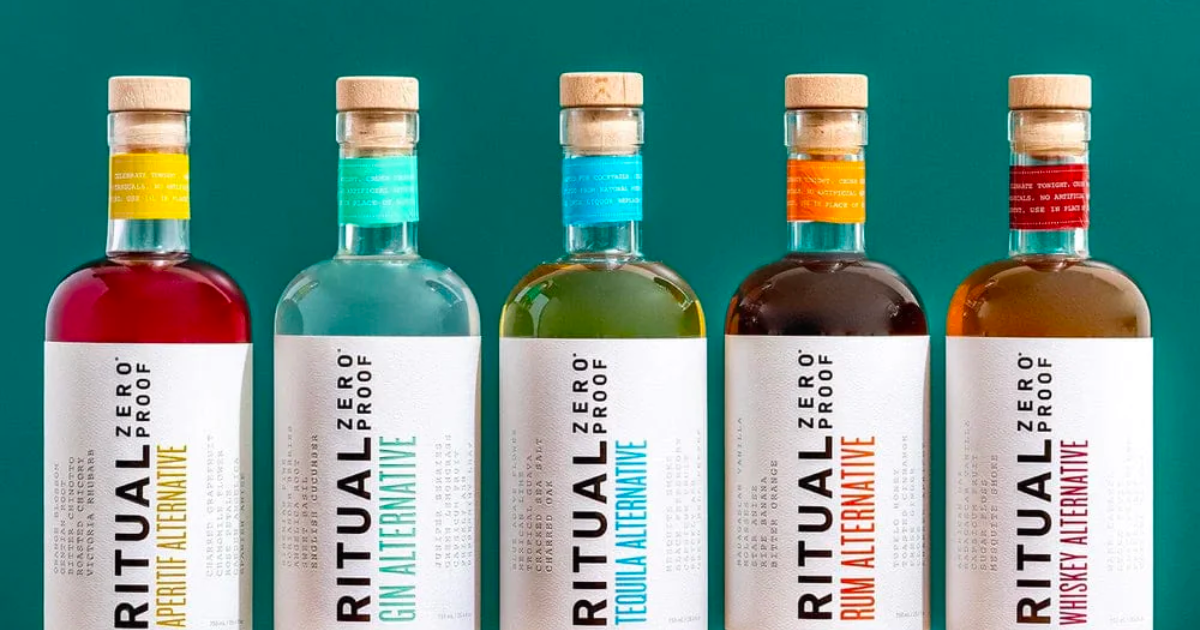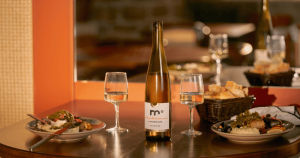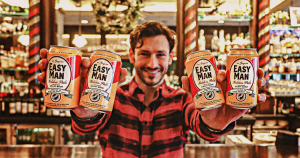In the expanding world of alcohol alternatives, non-alcoholic spirits have emerged as a sophisticated choice for those seeking to savor the ritual and taste of a cocktail without the alcohol. Bolstered by a growing demand for non-alc options, modern-day distillers have harnessed advanced techniques and technologies to craft spirits that rival their alcoholic counterparts in taste and complexity. Today, the non-alcoholic spirits market is booming, providing a range of flavors for enthusiasts everywhere.
But what are non-alcoholic spirits, exactly? This guide delves into these booze-free wonders, highlighting the breadth of the category and the best brands to try.
What is a non-alcoholic spirit?
Non-alcoholic spirits are distilled beverages that emulate the flavor profiles of traditional spirits like gin and whiskey, but without the alcohol content. Crafted through unique distillation processes or by blending botanicals, herbs, and other natural ingredients, these spirits provide an alternative for those seeking the sensory experience of a classic cocktail without the effects of alcohol. In the past five years, non-alcoholic spirits have gained traction in the beverage industry, offering sophisticated flavor complexities and expanding the realm of booze-free options.
Cynics are often quick to note that the term “spirit” is inextricably linked to alcohol, thus “non-alc spirit” is actually an oxymoron. They’re right. The term “spirits” for distilled alcoholic beverages stems from both the production process and historical cultural beliefs. During distillation, the transformation of liquid to vapor and back might have seemed ethereal to early practitioners, leading to associations with the immaterial or ghostly. This idea was reinforced by the Latin term “aqua vitae” or “water of life,” which echoed across languages and underscored the transformative and, often, medicinal effects of alcohol. Combined with alcohol’s role in spiritual rituals and its sometimes perceived otherworldly effects, the term “spirits” became a fitting descriptor for these potent drinks.
Here at Dry Atlas, we use the term “non-alcoholic spirit” anyway.
Types of non-alcoholic spirits
Gin
Non-alcoholic gin captures the botanical-rich essence for which traditional gin is renowned. Distillers employ a variety of herbs, spices, and citrus elements, with juniper often taking center stage, to emulate that signature gin taste. This category offers the crisp and aromatic experience of gin, minus the alcohol, making it perfect for a refreshing gin and tonic or a classic martini. Learn more in our comprehensive guide to non-alc gins.
Mezcal
Non-alcoholic mezcal is an ambitious endeavor given the spirit’s characteristically smoky and complex profile. Through advanced distillation techniques and the infusion of smoky flavors, non-alcoholic versions aim to evoke the essence of the agave-based drink. While they might not replicate the full depth of traditional mezcal, they provide a unique and smoky alternative for mocktails. There are only a few non-alc mezcals on the market, but we anticipate many more to come as this spirit continues to gain popularity and non-alc production methods continue to improve.
Rum
The tropical and sugarcane-rich notes of rum are cherished in the world of spirits. Non-alcoholic rum endeavors to capture these sweet and sometimes spiced profiles. Using caramel, tropical fruit, and even hints of vanilla, alcohol-free options can be a fantastic base for virgin piña coladas or mojitos. Explore non-alc rums with our comprehensive guide.
Tequila
Crafting a non-alcoholic version of this agave spirit is no small feat. Tequila’s distinct earthy and sometimes peppery notes are captured using a blend of botanicals and flavors that mimic its unmistakable profile. Ideal for virgin margaritas, non-alcoholic tequila brings the taste of Mexico to the alcohol-free table. Learn more in our comprehensive guide.
Vodka
Known for its neutral and clean profile, traditional vodka serves as a versatile base for countless cocktails. Its non-alcoholic counterpart maintains this versatility, providing a crisp and clean backdrop for mixers and other ingredients. With no overpowering flavor, non-alcoholic vodka is the go-to for those looking to create a wide range of mocktails.
Because alcoholic vodka is distilled with the goal of as little flavor as possible, cynics will say that non-alcoholic vodka is, well, water. That hasn’t stopped non-alc spirit brands like Spirits of Virtue from attempting this challenging and perhaps contradictory non-alc spirit.
Whiskey
Capturing the rich, oaky, and often caramel undertones of whiskey without alcohol is an art. Non-alcoholic whiskey brands leverage natural flavorings, spices, and even smoked elements to recreate the warmth and depth associated with this beloved spirit. Whether you’re in the mood for a mock old fashioned or a simple sip on the rocks, non-alcoholic whiskey offers a cozy and flavorful alternative. Learn more about non-alc whiskey via our comprehensive guide.
Other spirits
The categories above represent the most popular spirits in western cultures, and thus the categories with the greatest variety of non-alc alternatives available today. But it doesn’t represent the full list of non-alc spirit alternatives.
Brands like Lyre’s are pushing the boundaries and creating non-alc alternatives to spirits like absinthe, baijiu, and more. These spirit alternatives are especially remarkable given that many of their alcoholic corollaries are high proof spirits, which are harder to replicate in a non-alc option.
Distilled botanical spirits
Some of the most interesting things happening in non-alc spirits are happening in distilled botanical spirits. Think of distilled botanicals as un-gins.
Alternatively, think of gins as the original distilled botanical spirit. Juniper is a delicious botanical for distillation into a spirit, but there are tons of other botanicals that shouldn’t be overlooked! In hindsight, the choice of juniper from all the world’s plant botanicals seems limiting and maybe even arbitrary.
In parallel timelines, ancient distillers chose star anise or grains of paradise or fennel or cardamon instead of juniper to be the dominant botanical flavor in their distilled grain spirit creations. If you’re interested in exploring non-alc distilled botanical spirits, check out our comprehensive guide.
Novel Spirits
Creativity is also abundant in the category of novel spirits, the term we use to refer to spirits that don’t attempt to mimic the flavors of traditional spirits like gin and whiskey. They’re new and unique creations unlike what you’ve tasted before.
Many novel spirits employ so-called functional plant ingredients in an effort to promote feelings of calm, focus, relaxation, energy, etc. There are also plenty of novel spirits focused purely on the structure, body, mouthfeel and flavors of the liquid itself, with no attempt to change the drinker’s state.
Crafting non-alcoholic spirits
The process of creating non-alcoholic spirit alternatives should begin with a deep understanding of the flavor profile of the original alcoholic spirit. This entails a careful analysis of the key aromatic compounds, taste elements, and mouthfeel. Here’s a closer look at the journey:
Research and formulation
Before production begins, a considerable amount of research goes into understanding the traditional spirit they’re aiming to emulate. This involves identifying the botanicals, extracts, and flavors that give the spirit its unique character. For instance, if replicating gin, juniper’s piney essence is fundamental. But for something like whiskey, capturing the deep, oaky, caramel notes is crucial. Once these are understood, alternatives for these flavor profiles are sought.
Blending botanicals and ingredients
A significant portion of the flavor in non-alcoholic spirits comes from the botanicals used. Brands might steep herbs, spices, and other botanicals in water, similar to how tea is made. This process extracts the flavors and aromatic compounds. The chosen botanicals’ proportions are crucial; adjusting these ratios can lead to variations in flavor, from subtle to pronounced.
Distillation
Some non-alcoholic spirits undergo a distillation process, not to increase alcohol content but to refine and concentrate flavors. Distillation can capture the essence of the botanicals, allowing for a cleaner and more pronounced flavor profile. The alcohol, if produced during this distillation, is then removed.
Flavor refinement
After distillation, additional flavors or extracts might be added to enhance the spirit’s profile further. For example, certain compounds might be introduced to replicate the “burn” or warmth that traditional alcoholic spirits have, without introducing alcohol.
Testing and refinement
Before the final product is settled upon, multiple iterations are often created and tested, both by the producing team and potential consumers. Feedback is vital in ensuring the non-alcoholic spirit meets or exceeds the expectations of its target audience.
Packaging and distribution
Once the formula is perfected, the spirit is then bottled and packaged. Given the growing demand for non-alcoholic alternatives, many brands invest in premium packaging to reflect the sophistication and craft that goes into making these beverages.
Choosing the Best Non-Alcoholic Spirits
Selecting the best non-alcoholic spirits involves a blend of personal preferences, brand research, and understanding the beverage’s intended use. Here’s a guide to help you navigate the choices:
Understand your palate
Before diving into brand and product specifics, it’s essential to understand your flavor preferences. If you’re a fan of gin’s botanical taste, you’ll want to explore non-alcoholic options that prioritize those aromatic compounds. Alternatively, if you’re after the warmth of whiskey, you’ll be on the lookout for alternatives that capture its rich, oaky notes.
Reputation and reviews
As the market for non-alcoholic spirits expands, many brands are emerging, each with distinct offerings. Check out product reviews, expert rankings, or industry awards to get an idea of top-performing products. Word of mouth and personal recommendations can also be invaluable.
Ingredient list
A glance at the ingredient list provides insight into the spirit’s quality. Premium non-alcoholic spirits typically boast natural ingredients, avoiding excessive additives or artificial flavorings. The botanicals and other elements used can also give you an idea of the flavor profile to expect.
Versatility in cocktails
If your goal is to use the non-alcoholic spirit in various mocktails, you’ll want an option versatile enough to fit different recipes. Some products might excel as standalone sippers, while others shine brightest when mixed.
Sampling and tasting
If possible, attend tastings or purchase sample-sized bottles. Trying a spirit firsthand is the best way to gauge if it aligns with your preferences. Look for balance in flavors, the richness of aroma, and the overall mouthfeel.
Packaging and branding
While it shouldn’t be the primary deciding factor, the packaging can sometimes reflect the care and craft that went into producing the spirit. Brands that invest in high-quality, sustainable packaging often also prioritize the quality of the liquid inside.
The best non-alcoholic spirits
Today, there are many excellent brands creating high-quality spirit alternatives. No one brand nailed it with every one of their products. That said, here are six of the best overall non-alc spirit brands as of April 2024:
Cut Above
A recent entrant into the non-alc industry, Cut Above is already a customer favorite at Spirited Away. Embracing artisanal craftsmanship, Cut Above crafts premium non-alcoholic spirits that cater to the discerning palate. Their emphasis on high-quality ingredients ensures beverages that both surprise and delight, often blurring the lines between their alcoholic inspirations and their sober renditions.
Free Spirits
Living up to its name, Free Spirits offers a range of non-alcoholic beverages designed to liberate the modern drinker. Their formulations prioritize both flavor and functionality, with each drink also infused with adaptogens and nootropics to elevate the drinking experience.
Ritual
One of the first brands ever stocked at Spirited Away, Ritual Zero Proof’s spirit and aperitif alternatives remain fan favorites years later. They capture the essence and complexity of classics like gin, whiskey, and tequila, allowing cocktail enthusiasts to craft their favorite drinks without the alcohol but with all the flavor.
CleanCo
CleanCo ventures into the realm of distilled non-alcoholic spirits with a keen eye on sustainability and innovation. Their range is a testament to the art of distillation, providing a cleaner, calorie-reduced alternative without compromising taste.
Monday
As refreshing as the start of a new week, California’s Monday offers a gin, mezcal, rum and whiskey that promise zero hangovers. Their emphasis on organic botanicals and meticulous distillation processes results in a crisp, authentic taste that stands out in mixed drinks and neat pours alike.
Spiritless
Championing the “less is more” philosophy, Kentucky’s Spiritless focuses on reducing alcohol content without diminishing the soul of the drink. Their standout Kentucky 74, a non-alcoholic take on bourbon, exemplifies their commitment to crafting spirits that honor tradition while looking to the future.
How to drink non-alcoholic spirits
A few years ago, I wouldn’t recommend that anyone sip non-alcoholic spirits neat. Product quality simply wasn’t there yet. Today, it’s a different story. There’s no wrong way to drink non-alc spirits. The approach is now more similar to that of traditional spirits: it’s all about savoring the flavor.
To savor a non-alc spirit on its own, begin by pouring a small amount into a glass to appreciate its aroma. Take a moment to inhale deeply, noting the different botanicals and nuances. When you take a sip, allow the liquid to linger on your palate, identifying the layers of taste. Non-alcoholic spirits are versatile and can be enjoyed neat, on the rocks, or as the foundation of a mocktail.
That all said, the most common way to drink non-alc spirits is still in a mixed drink. When concocting, pair them with high-quality mixers to maintain the integrity of their flavors. Keep it simple or get fancy. For amateur and professional mixologists alike, the fun of non-alc spirits is in exploring different creations.
Regardless of how you sip them, doing so from the proper, high quality glassware will improve the experience and your enjoyment. There’s more to non-alc cocktails than just the liquid itself.
How to use non-alcoholic spirits to make mocktails
There’s virtually no cocktail that can’t be made booze-free. A few suggestions to bear in mind as you explore and experiment:
Cocktail-first approach
You no longer need to limit your search for mocktail ideas to just drinks that were originally conceptualized as mocktails, like Shirley Temples and Arnold Palmers. Today you can be inspired by any cocktail and adapt the recipe to replace the alcoholic ingredients with non-alc alternatives. Just swap each alcoholic ingredient with its non-alc version 1:1.
Low alcohol cocktails
Those who are on the no- and low-ABV spectrum may wish to replace some of the alcoholic ingredients while still using alcoholic versions of some ingredients, like the vermouth or the bitters. There’s no wrong way to make a cocktail! It’s all about finding what works for you, your unique palate and your unique preferences.
Replace, don’t forgo
To the extent mocktails have a bad reputation with sophisticated drinkers, it’s because historically mocktails were crafted by simply eliminating alcoholic ingredients from the recipe. A virgin Dark and Stormy was made by leaving out the dark rum. You don’t have to be a mixologist to realize that leaves you with just ginger beer and lime, hardly a complex, adult cocktail. So for best results, replace, don’t forgo, the spirit component(s) of your cocktail.
Be prepared to tinker
I also recommend treating cocktail recipes translated for mocktails as guidelines and not hard and fast rules. That is, you may find that the ingredient ratios need to be adjusted when making a non-alc version. In general, low proof cocktails like Aperol Spritzes require little to no adjustments to ingredient ratios to make a mocktail version whereas high proof cocktails like martinis call for greater adjustments. Read more on the latter in our guide to non-alc martinis.
Don’t mock the cocktail
Although I have no beef with the term “mocktail,” the insinuation of mockery can connote that non-alc cocktails are somehow less than or inferior to traditional cocktails. It doesn’t have to be that way! Using quality ingredients, clear ice, proper glassware and fresh garnishes all play a role in ensuring that your non-alc creations are just as sophisticated and enjoyable if not more so than their alcoholic alternatives.
Other FAQs about non-alcoholic spirits
Why would anyone drink non-alcoholic spirits?
There are numerous reasons why someone might opt for an alcohol-free spirit:
- Mindful Drinking: Many want to reduce their alcohol intake without sacrificing social experiences or the pleasure of savoring a well-crafted G&T or even a dirty martini.
- Health Reasons: Some individuals abstain from alcohol due to medications, health conditions, or personal wellness goals.
- Safety: Non-alcoholic options allow one to enjoy a cocktail without impairing their ability to drive or perform other tasks.
- Gastronomic Mixology: Non-alcoholic liquors can be a unique ingredient in complex cocktails, offering the flavor of traditional spirits without the booze.
Read more in our article What’s the point of non-alcoholic spirits?
Are non-alcoholic spirits the same as mocktails?
No, non-alcoholic spirits are standalone products meant to replace alcoholic spirits. Mocktails are complete drinks made using a combination of ingredients, which may or may not include non-alcoholic spirits.
How authentic is the taste?
Non-alcoholic spirits have made significant strides in replicating the flavors of their alcoholic counterparts. Using a combination of traditional and innovative distillation processes, along with the infusion of botanicals, herbs, and spices, many of these spirits capture the essence and complexity of the originals. While they may not always offer the exact depth or warmth brought by the alcohol itself, they often surprise and delight with their intricate flavor profiles. Some brands and products achieve an uncanny likeness, making them nearly indistinguishable in mixed beverages, while others offer a unique interpretation, expanding the palate of the modern, mindful drinker.
Are non-alcoholic spirits completely free of alcohol?
“Non-alcoholic,” “alcohol-free” and other terms are regulated and subject to agreed-upon definitions in most jurisdictions. Dry Atlas uses the American standards for these definitions:
- Non-alcoholic drinks contain less than 0.5% ABV
- Alcohol-free drinks contain less than 0.05% ABV
Different jurisdictions have different standards, so be sure to check labels to ensure a given spirit alternative meets your unique needs.
Are non-alcoholic spirits calorie-free?
While they generally have fewer calories than alcoholic spirits, they aren’t typically calorie-free. Ingredients and processing methods can affect calorie content.
Do non-alcoholic spirits have an expiration date?
Like traditional spirits, non-alcoholic alternatives do have a shelf life, which can be influenced by ingredients, packaging, and storage conditions.
How do they compare in price to alcoholic spirits?
Pricing varies, with some premium non-alcoholic spirits being on par with mid-to-high-end alcoholic brands, considering the craftsmanship and processes involved. Non-alc spirits deliver all the flavor of traditional spirits, plus they have the added value of having the harmful ingredient removed.
For more from Douglas, connect with him on LinkedIn.
Dry Atlas is a media company focused on alcohol alternatives. We deliver non-alcoholic beverage news, insights, and recs to over five million people annually. To stay up to date on all things non-alc, subscribe to our weekly newsletter.






